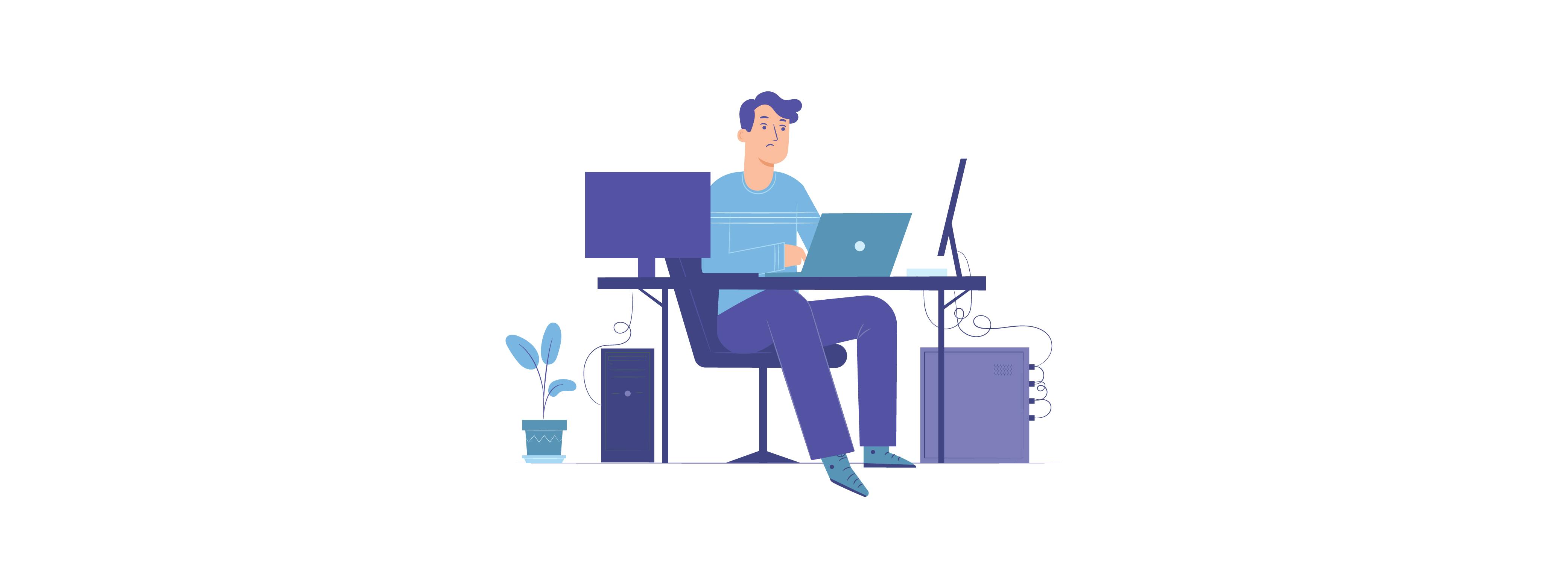14 Good Work Habits for Astounding Productivity

While there are plenty of complex productivity systems and good options for optimizing a schedule, there’s a lot to be said for having good work habits before all of that. In the chase for best work practices, getting back to basics and understanding how we work best is often overlooked.
In such cases, you’ll likely be ill equipped to stick to any semi-sophisticated system you’ve laid out. Not to worry, though, as we’ve created a compendium that will put you in a strong position to see the fundamentals that make a huge difference to your effectiveness.
We’ve broken these productive work habits into the three categories of personal performance, time management and teamwork. So, without further delay, here they are:
For Improved Personal Performance
1. Be Honest About Your Strengths and Weaknesses
Exaggerating your skill-set may seem harmless, but it can waste a lot of time and energy. While it’s estimated that around 30% of us bend the truth on our resumes, we’re here to say that it's okay if you don't know how to do something.
In most cases, the whole affair is made easier (and faster) by simply admitting your weak-points, especially within a company, where a task that you’re not suited for can quickly be given to someone else, allowing everyone to play to their strengths.
If you're not sure about an answer, no self-respecting workplace will scold you when you ask for help or clarification. Sometimes, a quick 2 minute explanation can save hours of unraveling and re-doing something gone wrong.
2. Keep on Learning. Use Your Mistakes
While we’re on the topic of skill, remember that learning is a lifelong process, which is particularly important in the business world. Always look for ways to improve your skills or pick up new ones, whether it's company-supported training or taking some online courses on your own time.
As for mistakes, well they’re inevitable and part of being human. Countless millionaires and business tycoons have some words of wisdom on overcoming failures, taking something away from them and turning that into success. The reason they all say it is because it’s entirely true.
Learning from your blunders, and not letting them define you, is a major distinction between average and exemplary. If you're taking the initiative to learn and grow, with full expectations of making mistakes at some point – an adventurous trial and error – you’re doing it right. Learn from them as they arise so you don’t make the same one twice. That’s how you really move forward!
3. Be Positive
Whew, with all this talk of mistakes, let’s remember the importance of being positive, too. Whether you’re working on something alone, or collaborating as a team, a positive attitude is an absolute prerequisite to quality work. It’s essential for success.
Positivity doesn't mean you should be a pushover, or ignore problems in efforts to keep up a smile. It does, however, mean you should be focusing on solutions rather than problems. Don't just think positive, but act positive in the moment, in order to foster a productive work environment where people are genuinely happy to share ideas.
Working in a finite space day after day, there’s bound to be tensions and problems that crop up, but true positivity means you address them directly rather than ignoring them or suppressing your feelings. Turn your concerns into actionable suggestions that are realistic and fair.
4. Practice Positive Self-Talk
Though you’ll often hear team leaders speaking of the importance of being positive towards others, what you’ll hear less often is that you should extend that positivity to yourself, too. Stopping periodically to formulate positive thoughts, a kind of self-talk, helps maintain motivation throughout the day.
As the science suggests, “At the individual level, there is compelling evidence that employees with higher subjective well-being tend to be more successful in the workplace.” In plain terms, when you stay positive, you work better and have higher job satisfaction. It seems self-explanatory, yet we find it rather difficult to set aside some time to think happy thoughts.
It’s two-sided, as you also might expect. Negative self-talk often appears in times of stress and it’s utterly poisonous. Try to repurpose bad emotions into a more constructive mindset. Calmly evaluate causes of stress and manage your time effectively to minimize any chaos. If you’re really keen to monitor your mood, you could always keep a mood tracker to recognize the patterns between stress and emotion.
5. Be Responsible for Your Own Professional Development
Unless you’ve got an absurdly helpful boss, no one is taking full responsibility for your professional development but you. A team member who is constantly learning new skills is an absolute treasure for an employer. As an individual, you should take advantage of any and all opportunities to learn, whether it's expanding your professional network, learning new skills, or making positive behavioral changes.
Identify your talents and use them whenever applicable. Getting to grips with what you can do well can help you maintain a positive attitude, which in turn changes how you view challenges. In fact, having successful experiences has been shown to raise self-efficacy, the belief of one’s ability to succeed at a given task or situation, most notably back in a 1982 psychology study.
You may have a gift for drawing or painting. It could be something else entirely, such as knowing a foreign language. The point is you can use all of your aptitudes as advantages, whether it’s landing a new job or moving up in your current one. Employers are always looking for those with unique skills and initiative, so get to it!
For Time Management
6. Be Punctual and Respect Deadlines
Start with an obvious one, shall we? Being on time is a sign of professionalism that shows consideration and commitment to others, translating to them that you value their time as much as your own. If, for some reason, you're genuinely late or can’t attend, always try to let someone know as early as possible so that they can adjust their plans.
Just as you should respect your colleagues by being punctual, sticking to deadlines shows dedication to goals and cultivates a form of self-respect, that feel-good moment of having time to spare, a brilliant boost for your self-confidence.
Actually, adhering to deadlines might just be the most critical habit of a career. It shows full control of time, a mastery of work, and respect for your team all at once. When managers trust you to complete quality within the set deadlines, you gain some serious reputation as a go-getting productivity guru.
7. Be Organized and Keep the Work Area Neat
Deadlines get a whole lot less stressful after you’ve effectively organized your work area. Staying organized prevents you from misplacing important documents or information, ensuring that you’re able to find exactly what you need when you need it.
Manic hunting for x and y often causes substantial delays, or prevents you from working on a project altogether. Not only that, a muddled desk gives you a harder time when trying to focus on your work: tidy desk, tidy mind, as the adage reads.
It’s extremely difficult to be a high performer if you aren't organized. Utilize the resources you have available to you. Even simple practices, such as color-coding your calendar and sticking to a daily routine or to-do list will make an enormous impact. If you’re an avid lover of tabs, highlighters and symbols, you might look into keeping a weekly or monthly spread in a bullet journal. Any kind of work plan that outlines critical tasks for the following day provides momentum.
8. Limit Distractions
If you can limit distractions during the workday, you will likely be more focused, task-oriented and able to achieve your goals. Consider how you usually spend your workdays, and identify things that take away your focus or prevent you from working at full capacity. Make a list of those things then try to make a plan to eliminate or avoid them.
If you consider yourself the kind of person who thrives in bustling work environments, think again. While a 2008 study from UC Irvine did find that interrupted work “may be done faster,” they explained that “after only 20 minutes of interrupted performance people reported significantly higher stress, frustration, workload, effort, and pressure.”
We’re all human, so you can still schedule a little time for distractions such as browsing social media or reading a casual article. However, as you’re aware these tasks usually steal more time than they deserve, use time-boxing to make sure you limit these activities.
9. Make Time for Family & Friends
It is easy to get wrapped up in your work without realizing that your own health and well-being is suffering in the process. This is why it’s important to balance your work with your personal life, being sure to set aside time for you and your loved ones.
It’s great to get work done, but don’t lose sight of these other aspects of life that bring joy and contentment. You don’t even need to stop scheduling and organizing if you struggle to switch these skills off... you can still pencil in your social activities and family trips, just be sure to prioritize them when the time comes, setting aside work for some healthy relaxation... you’ve earned it!
For Teamwork
10. Communicate Well and Honestly
This one is an absolute must. Communication is the lifeblood of the business world. How you communicate matters as much as what’s communicated. “It is recognized that self-confidence [and] good communication skills... are the most important factors for success and professional advancement,” reads one academic overview.
Lying can be a personal indictment, as well as a poor reflection on fellow employees and the larger business. Thus, being honest in your communications is necessary for success. Trust is built on honesty, so don't ever take it lightly.
You'll also build trust by honing the soft skill of workplace communication more generally. Learn to communicate clearly and concisely, only providing the information that's appropriate to share and nothing more. Don't gossip or talk of others behind their backs; this is bad communication and will always reflect poorly on you, or end up getting you in trouble.
11. Don't Be Afraid to Ask Questions
We briefly touched on this near the beginning, but it’s so important we thought to have a full section. A 2012 entry into Social and Behavioural Sciences reads, “Asking questions is a key element in the learning process... particularly at the higher cognitive level [where it] is also an essential aspect of problem solving.”
When you're new to a job or a situation, you will most probably have questions... actually, it’s more worrying when someone doesn’t ask anything. It's okay to ask for clarification or direction, but tread carefully, as you don't want to annoy your co-workers or, worse, have them micromanaging you. That being said, the more you know, the better you can do your work, so don’t be shy!
More generally, asking intelligent and inquisitive questions is another great way to demonstrate your value. Companies flourish when they encourage constructive feedback, particularly from newcomers, who have a unique perspective on the inefficiencies that many have become blind to. As an added benefit, you not only learn more about your company, field, and industry, but you illustrate that you're actively interested in improving your comprehension.
12. Be Dependable
We know it’s important to be punctual, but what’s the actual reason for that? Well, punctuality is just one demonstration of dependability. When you make a promise, whether it’s a meeting or a beach day, you should do your best to follow through with it.
If you think it’s unlikely that you can follow through with your promise, don't make it in the first place. People will quickly learn that they can count on you and that you are untrustworthy. That’s a very bad place to be, even more so within a team.
In the fast-moving world of business, a deal will quickly go south if one party learns they cannot depend on the other. Being true to your word, whether it’s a promise to others or yourself, is a principle of productivity.
13. Work on Your People Skills
Getting along with colleagues, and hopefully turning them into friends, will make your job more enjoyable while helping you get ahead, too. Fostering wholesome relationships with co-workers builds a stronger support net for when you need it most.
The ability to listen is an important people skill, as it clearly shows you value your conversation partner, allowing you to relate to them and show empathy when appropriate. Just take the time to hear people out and you’ll be amazed at the positive impact it has on your relationship.
Body language is another powerful tool to practice. In a 1971 publication, renowned psychology professor Albert Mehrabian presented his model that suggested 55% of communication is body language, 38% is tone of voice and only 7% the actual words used. When speaking to others, try to frame yourself with positive body language and be conscious of your tone, as insincerity on your part will quickly become disinterest on theirs.
14. Be a Team Player
It’s a little on the nose for the teamwork section, but it still needs to be said! Continuously look for ways to work with others, rather than against them. Collaboration can help you achieve your goals, develop new skills, and work more efficiently in the long run.
When you work well with your co-workers, it can help your team achieve their goals and can make your job easier in the process. This is what makes teamwork such a critical skill, one that will take you much further in your career.
It is also a splendid idea to help out any colleagues, even if they’re working on a project you’re otherwise not involved with. Putting the needs of a team above your individual pursuits shows others you have true team spirit!
We know there’s a lot there, but success is a tough nut to crack. Lasting, healthy habits are notoriously tricky to establish, but once you’ve done it, there is truly no limit to your productivity.
The rewards of maintaining good work habits are clear: big jumps for professional development, higher productivity power and healthier relationships with colleagues, all the while keeping a positive outlook that breeds success.


